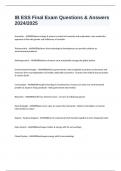Exam (elaborations)
IB ESS Final Exam Questions & Answers 2024/2025
- Course
- Institution
IB ESS Final Exam Questions & Answers 2024/2025 Ecocentric - ANSWERSpure ecology & nature is central to humanity and emphasizes a less materialist approach to life with greater self-sufficiency of societies Technocentric - ANSWERSbelieves that technological development can provide solutions...
[Show more]



